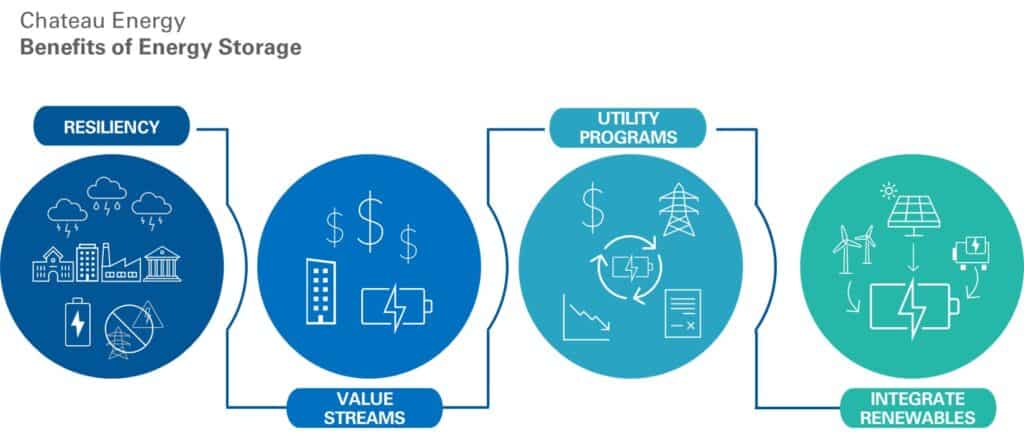Battery energy storage systems (BESS) enable flexible management of energy usage and unlock the full potential of on-site generation powered by variable renewable energy resources, like solar. By equipping facilities with standby power, organizations solve many challenges that face their facilities, operations, and productivity. Chateau Energy Solutions can assist your organization with energy storage to improve reliability and resilience, lower costs, integrate distributed energy resources, and reduce environmental impacts.
As an Energy Storage expert, the Chateau Energy team is experienced in developing energy storage solutions for a variety of applications, including solar energy storage. We will complete a skilled evaluation through a feasibility study, develop a customized technical design, offer financing options, and provide skilled engineering and construction capabilities to deploy an Energy Storage solution tailored for your organization. We are vendor agnostic and technology neutral. Only the most reliable and cost-effective resources will be obtained during the procurement process. Testing and commissioning is an integral step we take in the process to integrate seamlessly with a utility.
Energy storage is an inviting option as it allows energy to be available instantly, requires little space, and is easily scalable. Other factors organizations consider when thinking about energy storage include supporting decarbonization, sustainability, or ESG goals.
Energy Storage provides the following benefits:

Resilience. When grid power is interrupted by a curious (rogue) squirrel or a fallen tree, battery energy storage can provide emergency backup power, ensuring that your facilities stay plugged in during disruptions or outages. Energy storage systems are highly controllable assets that can dispatch energy to your facilities when they need it most. As noted by the Energy Storage Organization, as the cost of outages continues to rise, the value of enhanced reliability and improvements in resilience also increases. Energy storage provides reliability and resiliency that is critical to organizations.
Value Streams. In addition to the resilience provided by energy storage systems, battery energy storage systems can drive financial value through several other channels. When your facilities encounter their peak electricity demand, for instance, on a hot summer day, energy storage systems will discharge to offset that demand. Reducing utility demand charges is just one value stream that is accessible to energy storage.
Utility Programs. Another valuable application for energy storage comes through participation in utility Demand Response programs. In an effort to manage the supply and demand variability on the electric grid, some utilities offer incentives that compensate large power users to draw down their electricity consumption during grid emergencies and other periods of high demand on the grid. With energy storage systems, large consumers can respond to these demand response events and receive attractive compensation, all while maintaining their operations.
Integrate Renewables. Energy storage systems unlock the full potential of on-site generation like solar. When your local generation produces excess energy, BESS stores that power to be used at a later time. This dispatchable energy can then be used whenever an organization chooses to. For this reason, energy storage systems optimize the return on your investment in on-site generation.
Energy storage can be deployed as one component of a microgrid or as a standalone distributed energy resource (DER). Based on your organization’s energy profile, we will provide comprehensive energy and financial models to determine the optimal application of energy storage. Chateau Energy’s integration experts can design, install, commission, and provide support services for a customized energy storage system.
Chateau Energy Solutions Making Energy an Asset®
Ready to get started on the path to energy efficiency and sustainability?